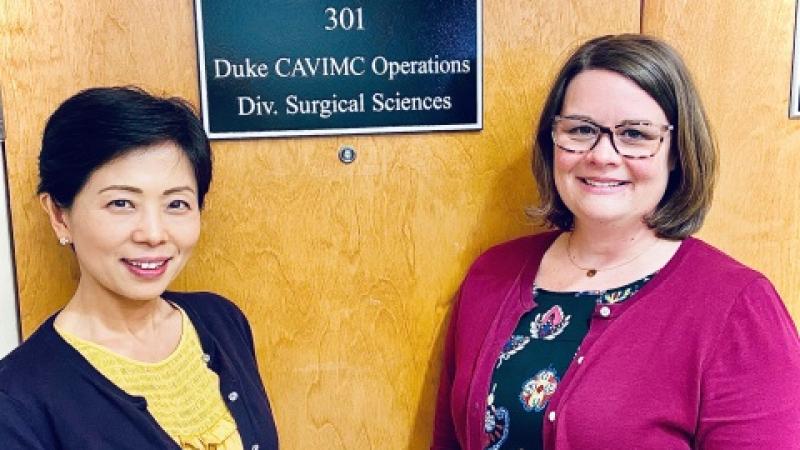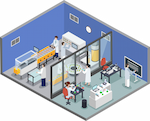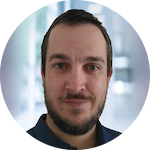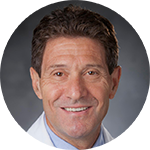
Resilience and Dedication of Project Managers Helps Keep CAVIMC Moving Forward
Above: Dr. Hongmei Gao (left) and Kelli Greene (right) stand outside of the Duke CAVIMC Operations facility | Photo credit: Dr. Hongmei Gao
When David Montefiori, PhD, was first invited in 2006 to submit a proposal for a Collaboration for AIDS Vaccine Discovery (CAVD) grant being funded by the Bill and Melinda Gates Foundation (BMGF), he noticed one programmatic requirement that begged from him a simple question: “Why do we need to have project managers?”
At the time, the role of scientific project managers in academic settings was less visible than it is today.
The answer to that question became quickly evident after Dr. David Montefiori, Professor in Surgery, Division of Surgical Sciences, enlisted Hongmei Gao, MD, MBA, and Kelli Greene, MPH, PMP, to assist him in managing the Comprehensive Antibody Vaccine Immune Monitoring Consortium (CAVIMC) program.
Now, 16 years after receiving the first CAVIMC award, Dr. Gao and Greene still work alongside Dr. Montefiori as directors of program management for the consortium. Together, they are responsible for directing the day-to-day operations of the consortium, which provides standardized assessment of antibody responses to candidate HIV vaccines, and supporting its nine global principal investigators (PIs).
“We help decide the framework of the program, the aims, our goals, and then how to execute the CAVIMC's activities and manage our partnerships with CAVD collaborators to meet our goals,” says Greene.
The Glue to the Puzzle

Scientific Research
Project Manager,
CAVIMC Program
Dr. Montefiori, Dr. Gao, and Greene all insist that the continuation of the program, which recently received its fourth five-year award, would not be possible without all the laboratory staff, scientific project managers, and early career investigators involved.
“The project managers are really the glue that puts the different pieces together and moves everything forward,” says Dr. Gao.
Two of these project managers are Kelly Seaton, PhD, and Nicole Yates, PhD, who have been working with the CAVIMC for seven and ten years, respectively.

Dr. Seaton says that the roles of scientific project managers are important to projects like the CAVIMC in order to help keep the work on track and meet critical milestones.
“Results of our work are directly informing decision making for next steps in product development,” she says, “so it’s important that we provide high quality data to the developers making those decisions.”
Dr. Yates also emphasizes the enjoyment she receives from being involved in the scientific processes. “It is rewarding to see how the results from assays done as part of the CAVIMC inform the next iteration of HIV vaccines as they move through the pipeline.”
“This is...a highly dedicated group of individuals, for whom failure [is] not an option,”
—David Montefiori, PhD, Professor in Surgery, Division of Surgical Sciences

Scientific Research
Project Manager,
CAVIMC Program
In academic science, being adept in project management in and of itself is not enough to successfully lead robust programs like the CAVIMC.
“You have to understand the science to be really effective at the projects you’re managing,” says Greene, highlighting the impact and importance of having a program full of scientific project managers.

Postdoctoral Associate,
CAVIMC Program
The CAVIMC investigators also attribute the continued growth of their program to the efforts of early career investigators like Dieter Mielke, PhD, a postdoctoral research associate who became involved with the program in 2016 while completing his doctorate degree in one of the CAVIMC labs at the University of Cape Town, South Africa.
“I’m very happy to see how so many of the investigators we have been working with over the years have grown,” says Dr. Gao on the personal and professional development that lab members like Dr. Mielke have received from the consortium.
On his own development and involvement in the program, Dr. Mielke says, "I have learnt numerous skills, among them an understanding of how to develop and qualify assays to ensure they are reliable in immune function measurement.”
“It is rewarding to see how the results from assays done as part of the CAVIMC inform the next iteration of HIV vaccines as they move through the pipeline.”
—Nicole Yates, PhD, Scientific Project Manager, CAVIMC
The Ripple Effect
The efforts of scientific project managers and early career investigators extend beyond the research being conducted for HIV vaccines. When the COVID-19 pandemic struck, scientists worldwide, including consortium investigators, pivoted their focus to the current need.

Professor in Surgery,
Division of Surgical Sciences
“We started seeing with COVID-19 that everybody around the world wanted to work together to develop a vaccine,” says Greene. This synergistic method of collaborating to generate and quickly disseminate data is the cornerstone of the CAVD, and in February 2022 the laboratories of Drs. Montefiori and Guido Ferrari, including Greene and Dr. Gao, received a letter commending their strong work ethic and resilience during the pandemic. The sender: Dr. Anthony Fauci, Director of the National Institute of Allergy and Infectious Diseases (NIAID).
“This is...a highly dedicated group of individuals, for whom failure [is] not an option,” says Dr. Montefiori of the laboratory members recognized by Dr. Fauci.
Greene adds, “The thing about what we’re doing in the CAVIMC is that we're conducting really impactful HIV research. Participating in the CAVIMC also has a ripple effect in providing opportunities for young scientists to align their interests and talents to shape their professional development.”
Give to Duke Surgery
A gift to the Department of Surgery is a gift of knowledge, discovery, and life.